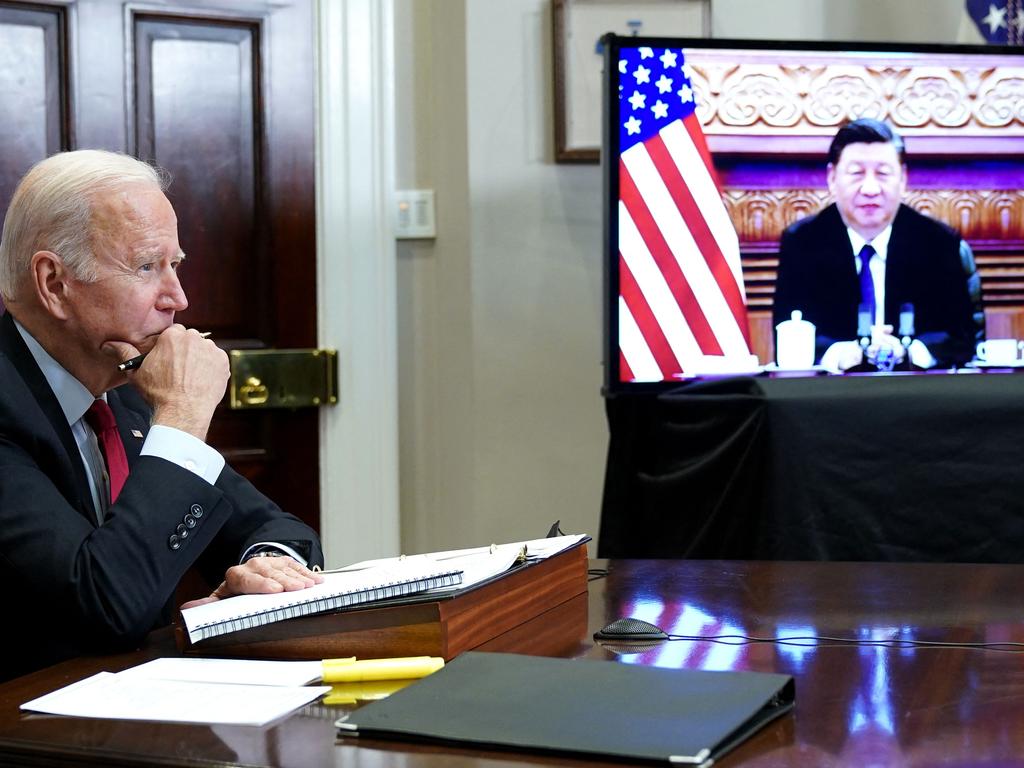China nuclear build-up raises risk of war with US, Taiwan invasion
China’s ‘unprecedented’ nuclear weapons build up has provided it with the confidence to invade Taiwan, according to a US congressional report.

China’s “unprecedented” nuclear weapons build up has raised the risk of war with the US and provided the People’s Liberation Army with the confidence to invade Taiwan, according to a new report by an influential US Congressional commission.
The analysis of the communist superpower’s growing economic and military clout, published on Wednesday in Washington, recommended the US drastically clamp down on commercial ties with China and take “urgent measures to strengthen the credibility of US military deterrence”.
“China’s growing nuclear capabilities raise the risks of unintentional nuclear escalation or a deliberate nuclear exchange during a conventional conflict in the Indo-Pacific,” the 550-page report by the US-China Economic and Security Review Commission found.
China was on a trajectory to become a “nuclear peer” of the US, as it constructed “hundreds of new silos for its intercontinental ballistic missiles and grew its stockpile of warheads”, the commission said.
“PLA leaders now likely assess they have, or will soon have, the initial capability needed to conduct a high-risk invasion of Taiwan if ordered to do so by CCP leaders,” it added.
The report praised Australia’s resilience in the face of Chinese efforts to coerce Canberra, noting how Chinese restrictions on Australian agricultural and coal exports had had “minimal effect” as exporters successfully found other markets.
“China unsuccessfully sought to compel Australia to make key policy concessions on more than a dozen matters ranging from Australia’s domestic freedom of expression to its international advocacy for an independent COVID-19 investigation,” it concluded.
Written by experts appointed by both Republicans and Democrats in Congress, the report highlighted the significant challenge China presented to economic and political stability in particular in the Asia-Pacific.
“Whether spreading fake information designed to interfere in elections in Australia; gutting the education system and judiciary in Hong Kong; or carrying out belligerent military incursions …, China has transitioned from shaping global institutions from within to using punishing sanctions … and military power … to bend the will and destroy the identities of individuals and nations,” they said added.

The analysis, which casts the CCP as increasingly “paranoid” and “triumphalist”, emerged two days after Presidents Biden and Xi conducted a virtual meeting, initiated by the US, that was intended to “ease tensions” and establish “common sense guardrails” to allow peaceful competition.
Senior Taiwanese security officials kicked off a two-day meeting with the Biden administration in Washington on Wednesday, after President Xi told the US President he would take “drastic actions” if he felt provoked by the island democracy.
Few military experts believe Taiwan has the capacity to defend itself and China and others doubt the US would risk a nuclear war to defend the island democracy. Australia, the US, and UK signed a security pact, AUKUS, in September to bolster their military powers in the Asia-Pacific,
Apart from concerns that China will seek to retake Taiwan, which Beijing has long seen as a wayward province, the two superpowers are at loggerheads across multiple fronts including China’s economic coercion, human rights abuses within China, climate change policy, and the origins of the coronavirus.
The government in Beijing was “both confident and paranoid, insistent on its superiority but increasingly fearful of subversion and failure”, the Commission found, pointing to a range of economic weaknesses such as rising debt, demographic decline, and environmental degradation.
“Politically, the CCP faces internal disunity manifested not only among CCP members but also in the highest levels of the policymaking apparatus,” it said.
The growing centralisation of power in the hands of President Xi and the increased role of the CCP in the commercial life of China prompted a recommendation that authorities be able to block American investment in China where it could jeopardise US interests.
“Traditional definitions of state control in an entity no longer apply because any entity may be compelled to act on behalf of the Chinese government’s interest, regardless of the state’s formal ownership,” the report found.








To join the conversation, please log in. Don't have an account? Register
Join the conversation, you are commenting as Logout